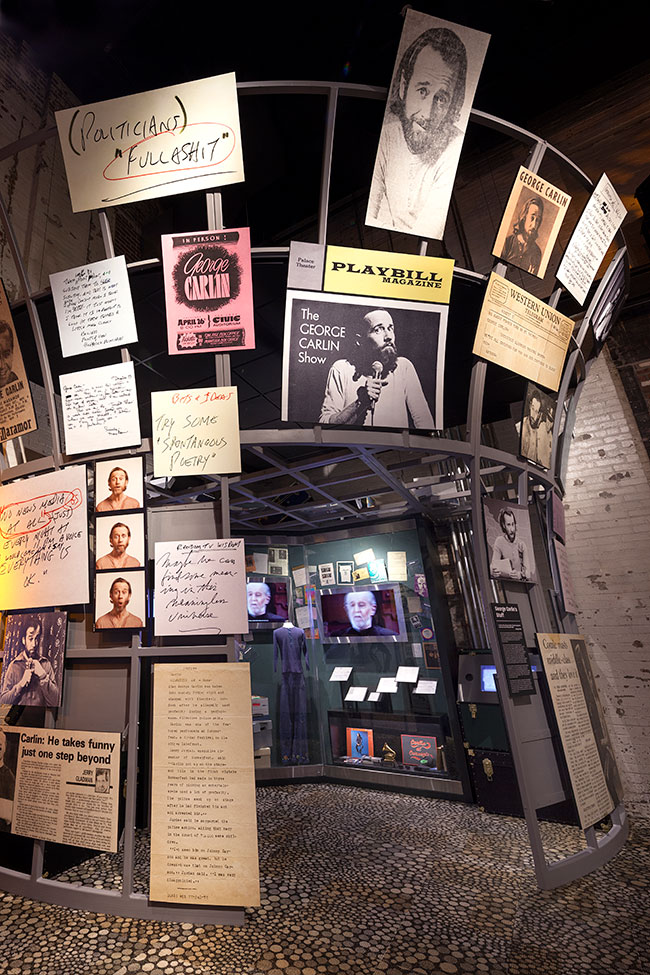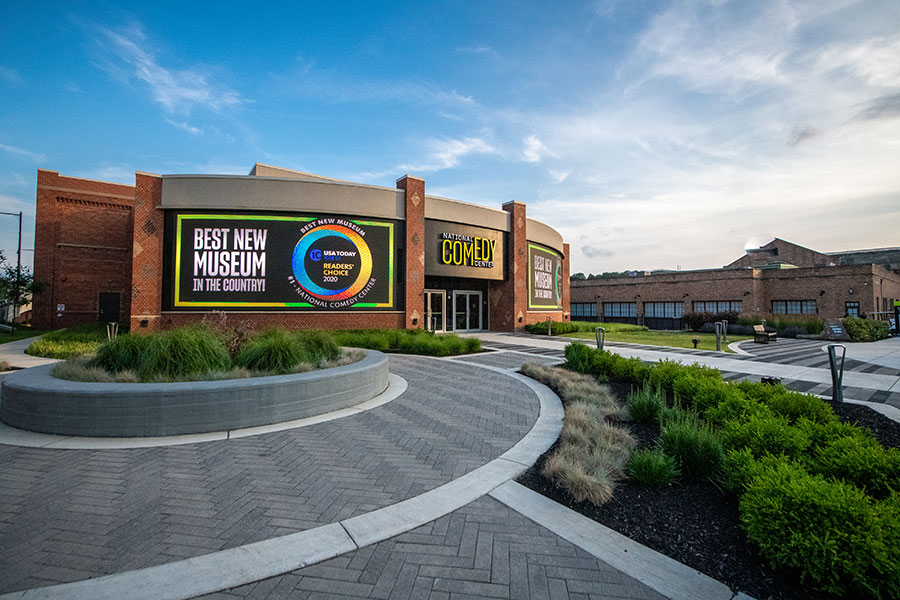The Healing Power of Laughter: An Immersive Tribute to George Carlin at the Lucille Ball Comedy Festival

Comedian George Carlin performs at San Quentin prison in a show put on by the Hell's Angels in 1976. Photo: Ted Streshinsky/Corbis via Getty Images
George Carlin once mused on the idea of a machine where he could write a joke and have it instantly beamed around the world.
Although the legendary comedian took his final curtain call in 2008 just a little while before Twitter gained a foothold, for better or worse, as a powerful mode of communication, the concept, which Carlin floated on late-night TV, has ensured he and his legacy are a long time from taking a final bow.
His legacy is set to be renewed once again this week as comedy fans the world-over make Jamestown, N.Y., a destination for the annual Lucille Ball Comedy Festival. An ongoing tribute to the beloved redhead in her hometown, the festival is a celebration of both the art of comedy and the healing power of laughter.
At the heart of it all is the National Comedy Center, an acclaimed interactive facility dedicated to people who, like Ball and Carlin, made the world laugh — and maybe even see the world a little bit differently.
One of the centrepieces of the National Comedy Centre is an immersive tribute to George Carlin, making use of his extensive archives, now housed at the site thanks to his only daughter, author and actress Kelly Carlin.
The tribute is a no-holds-barred look at the evolution of George Carlin’s comedy and, integral to that, his outlook on the world — one which continues to inspire and spark debate.

Kelly Carlin, 60, is reluctant to share how she feels her dad would address polarized state of the world (thanks in no small part to the platforms he once pondered) but says the work he left behind helps tell that story.
“His legacy is cemented, we all know that, but the fact that this man who has been dead for 15 years [still] trends on Twitter, especially in the last four years when any sort of big news hit, it’s because my dad hit those topics in his comedy and was speaking truth to them 15, 20, 25 years ago,” says Kelly.
“It just shows the power of his thinking, the power of his insight … we would all laugh at it, life goes on, and here we are now; we’re dealing with environmental issues, we’re dealing with income inequality, we’re dealing with a lack of critical thinking in our politics and public discourse, we’re dealing with political correctness that has splintered the nation in a huge way … I think his work is as relevant as anything right now and I think his fans are as rabid as they have ever been about what he said and what he was trying to say to us.”
With a chuckle, she adds, “Everyone is now making the point of [what he said years ago] but I always laugh and want to say, ‘Yeah, I feel that way too, but did we really listen? No, so who is that on? Is it on that person over there? No, it’s on all of us, especially those of us who were thinking about these things and having these insights.”
Legacy Keeper
If we didn’t listen the first time, thanks to Kelly we now have many more chances for another try.
As an only child, Kelly Carlin is her dad’s legacy-keeper and it’s a role she doesn’t take lightly. When he died, he left behind three storage units of material for her to go through. Much of it was important, some of it was not, but the weight of what fell into the first camp was never lost on her.
“This is a man who, when people talk about the Mount Rushmore of Comedy, he’s always on it. Whether it is Richard Pryor, Lenny Bruce, Robin Williams … he’s always on there, especially in the modern era of comedy, post-1960,” says Kelly. “I knew it was important on some level and it really meant something to him — but what do you do with this stuff?”
The National Comedy Center wasn’t the first organization to approach Carlin on starting a tribute to her legendary dad. Others came with their proposals, but Kelly didn’t feel a fit.
“I thought, ‘Well, let’s just give it to the Smithsonian,’” she says of the myriad papers her father left behind, everything ranging from jokes, written hastily on scrap paper, that eventually became part of the comedy lexicon to travelogues from cities he played during his storied career.
“I really feel like one of the things I have been called to bring forth into the world for my father is all the parts of him that he didn’t show the world: his humanity, his heart, his connections, his inner life — as much as you can. I knew I wanted a home for that and I wasn’t finding it,” says Kelly.
But fate intervened when she learned, by chance, that one of her neighbours, a designer, had been tapped by The Lucille Ball-Desi Arnaz Center (also in Jamestown) to make the dream of the National Comedy Center a reality.
Kelly was initially hesitant to entertain what they had in mind. While she counts Lucille Ball among her personal heroes — “she, Lily Tomlin, Carol Burnett, the women who changed my brain about what was possible in the world” — she initially felt it might be “another people-in-the-middle-of-nowhere-doing-a-comedy-museum.”
An “Incredible Partnership”
Kelly’s perspective changed when the centre invited her to perform her one-woman show — A Carlin Home Companion — for a hometown crowd. There, she met with the principals behind the idea, took in their vision, and what they hoped to bring to life with the tens of millions they had fundraised to that point.
“This was real, the people were real. They weren’t working some angle like entertainment people do at times. I knew they were serious, I knew the region was serious about promoting it, and I thought to myself, not only would my father’s stuff have a home, but it would be featured. I also knew their bigger goal was to lift the region economically and to put Jamestown back on the map in some way. I could participate in affecting real people’s lives in a tangible way.”

She was also struck by the local arts scene in Jamestown and surrounding communities, giving her the sense she was entering a “creative hub,” an idea that, “just made me sing. I went all in and it was one of the best decisions of my life — it has been an incredible partnership and relationship.”
Carlin’s involvement has also helped pave the way for other comedy titans and their estates to find a secure home for their comedic treasure troves, including the late Carl Reiner, who was an early supporter of the Center’s development, and the estates of Joan Rivers, Rose Marie, and, most recently, Betty White.
The Connecting Power of Laughter
When visitors enter the National Comedy Center, they’re given a fob that guides them through interactive experiences. At the outside, visitors are asked to tap the fob at one of many kiosks to select the comedians, actors, television shows, films, and more that make you laugh. Stations throughout provide a curated experience tailored to your tastes.
The real power potential and power of the Comedy Center is the opportunity to remove all the identities that we have beyond what makes us laugh, Kelly says. “When we do that, we get to our hearts and we get to our souls. My dad used to say when people are laughing their minds are open, their hearts are open. There is a part of your physiology that happens when you’re laughing. You’re no longer in a space of putting your walls up; you’re letting things in and things are affecting your mind and body at the same time.
“There’s something about walking into a place where all you hear is laughing for two, three or four hours — where on the planet is that true otherwise? It’s real laughter about the things that make you feel, see, hear … and I think that is the essence of our humanity on so many levels.
“Will it change the world with a sweep of a magic wand? Will it get people to stop fighting on social media? No, none of that is going to happen, but if we can all walk out of there feeling a little bit more connected to each other, just a little bit more, maybe there’s a chance we can feel connected and start to collaborate on the big things we need to work on with this planet.”
The Lucille Ball Comedy Festival takes place in Jamestown, NY (an hour’s drive from Buffalo) August 2 – 6, with headliners Gabriel “Fluffy” Iglesias and Taylor Tomlinson, showcases for up-and-coming comedians, and tributes to Lucille Ball, Vivian Vance and more. Visit comedycenter.org.
RELATED: